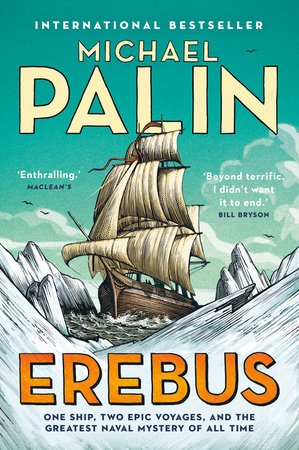 |
| Any resemblance to the "Permanent Crimson Assurance" is purely coincidental. |
While not an academic work, it's an entertaining one, and the basic story of Sir John Franklin's ill-fated final attempt to find the Northwest Passage is back-dated to the evolution of the Royal Navy in the post-Napoleonic period and the construction of the ship Erebus as a vessel made to fling bombs at shore installations. At just over 100 feet in length, Erebus was not large, but she was built immensely strongly to bear the forces of her armament. She saw little action in the largely peaceful decades after Waterloo, but Britain's Empire and commercial consideration gradually enlisted, according to Palin, an underutilized Royal Navy into the cause of exploration for its own sake.
Erebus was therefore further strengthened (with wood, naturally), and, under the command of Captain James Clark Ross, an almost stereotypically dashing and handsome specimen who, fortunately, had deep seafaring skills, the heavy and slow sailing ship, along with the equally ponderous and slightly smaller Terror, attempted to reach the South Magnetic Pole over several seasons, starting in 1839.
Palin is very good here and indeed this part of the story, being well-documented thanks to both ships returning, battered but intact, to tell of their adventures. What shines besides the sheer skill of wind-powered, wooden ships attempting to maneuver in Antarctic pack ice are the various personalities of the officers (mostly, as the seamen were rarely expected to journal, if they could write at all) and how the stresses of their mission's goals, along with the nature of their disparate personalities, led to outcomes that might have otherwise been avoided. Captain Crozier, of the Terror, for instance, seems to have had an unwarranted inferiority complex that did not allow him to further his own career in situations, such as the search for the Northwest Passage, where he had greater experience and, likely, skills, than Franklin, who was comparatively old for the job and was seeking redemption of his own reputation for a disasterous governorship of Tasmania.
Palin's skill as a writer is in contrasting small moments on ships distant in time and technology with the larger thrust of an optimistic society trying to reconcile a rapidly modernizing economy with older notions of class divisions and military habits of mind. Science was not the purview of professionals as it is today; the captains of these ships had to be very up-to-date in a variety of areas as they were attempting to establish facts, such as the shape of the earth's magnetosphere, with basic instruments in difficult conditions. That is the real story of "Erebus", and Palin tells it well, and, not unexpectedly, with a leavening bit of humour here and there.

Of course, Erebus and, eventually, Terror, were found off King William Island in Nunavut in 2014 and while we are never likely to know precisely why the crew attempted, tragically, to walk south to Hudson's Bay outposts hundreds of miles away, we can, thanks to Palin's writing, get a sense of who such explorers were and why they, mostly cheerfully, spent years boldly going to the ends of the earth.